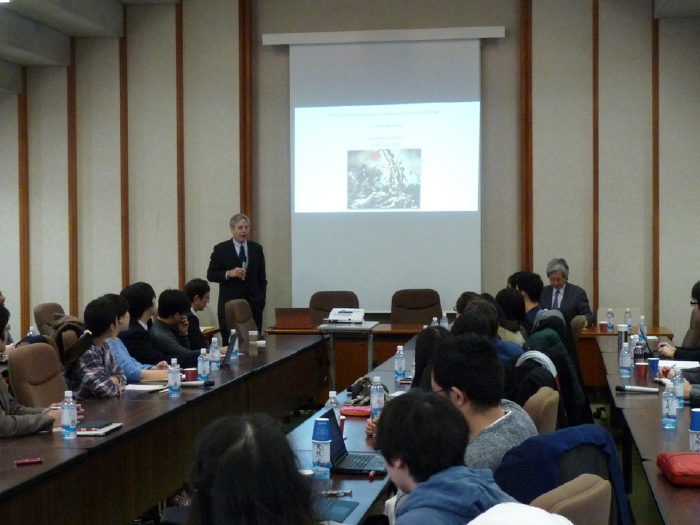Distinguished Guest Seminar with Professor Ikenberry
| Date: | Wednesday, February 1 2017, 10:00-11:30 |
|---|---|
| Venue: | Law#4 building 8th floor, the University of Tokyo Hongo Campus |
| Subject: | Cracks in the Liberal World Order: The Crisis of Democracy and Liberal Internationalism |
| Lecture: | Professor G. John Ikenberry,Princeton University |
| Language: | English |
| Hosted by: | Security Studies Unit, Policy Alternatives Research Institute, the University of Tokyo |
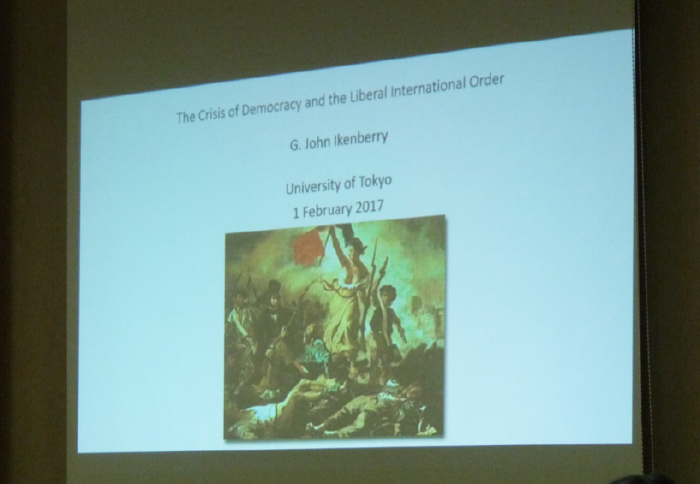
John Ikenberry, Albert G. Milbank Professor of Politics and International Affairs at the Department of Politics and the Woodrow Wilson School of Public and International Affairs, Princeton University, delivered a lecture to graduate students at the University of Tokyo, entitled “The Crisis of Democracy and the Liberal International Order”. The event was co-hosted by the Security Studies Unit.
The lecture was preceded by a brief address by Kiichi Fujiwara, Professor of International Relations at the University of Tokyo, who introduced the speaker as a veritable “rockstar” of IR studies, namely a scholar of great and deserved fame for his work on international politics, and particularly liberal internationalism. In his last book, “After Victory”, Professor Ikenberry highlights the role of the US in the post WWII reconstruction of a world order no longer based on sheer hegemony and force, but on institutions, shared rules, and the restraining of military might.

Professor Ikenberry started his lecture by thanking Professor Fujiwara, and by remembering the latter’s outstanding achievements as a scholar and teacher, as well as his vast expertise in cinema. He introduced the topic of the lecture by stating that with all probability the momentous year 2016, with the Brexit referendum and Trump’s victory in the US presidential elections, marks the end of an era. This is all quite surprising given the magnitude and the speed of the change, certainly unexpected, as if political analysts were constantly missing something which has suddenly materialised. Indeed this is the key of Trump’s success, as he managed to mobilise groups which had been overlooked by politicians and the media. Trump and Brexit certainly mark a crisis of democracy and liberal international order. But there have been crises before. However, this may be a deeper crisis than the previous ones, which cast shadows on the long period (over two centuries) of liberal-democratic advances in the world. We can observe several disturbing phenomena: retrograde democracies with increasing authoritarian tendencies (Poland, Hungary, Turkey, India, Philippines), democracies struggling with a crisis of leadership (Korea), and finally the UK and US, which seem to be withdrawing from the very international order they have created. This latter point is historically unusual and quite difficult to understand.
More in general however, there seems to be a crisis of the liberal international order. The grand project of building an open, multi-later, and progressively-oriented world order seems to be in trouble. This is to be inscribed within the crisis of liberal modernity.
The surprise, said professor Ikenberry, is exarcebated by the fact that only 25 years ago what we are witnessing today seemed unthinkable. After the collapse of the Soviet bloc we observed an new wave of democratisation, and massive integration of national economies into one global economy (China joined the WTO), as well as the strengthening of liberal institutions such as the EU and NATO. For a number of years after 1992, nobody could seriously claim that there was any credible alternative to liberal international order and democracy.
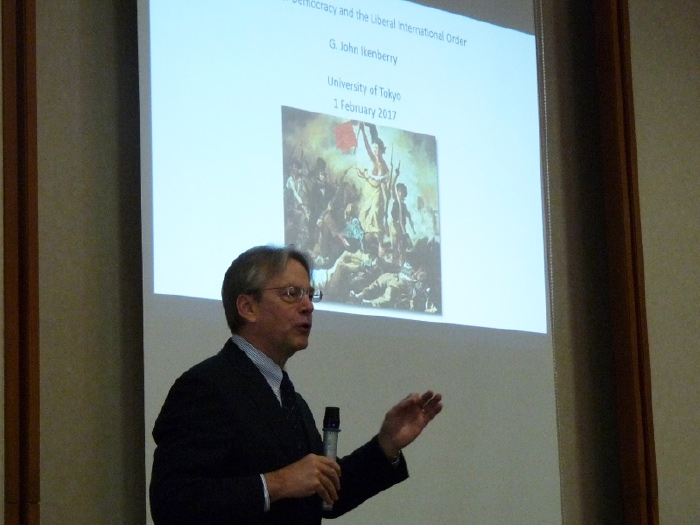
The triumphalism of the 1990s is now over. A major blow came with the 2008-2009 financial crisis, which occurred for the first time in the US, the heartland of the free world. The crisis signalled that something was clearly not fine within the economic structure of the global liberal order.
Particularly the crisis of the EU is troubling for liberals: we used to think that the Europeans had learned from the past, and move on into a new conception of politics. But now the EU is mired in a very severe crisis, and it may well disintegrate. The crisis in Europe is possibly more severe than that of the US, because Trump may eventually pass, but putting back together the puzzle of European politics appears exceedingly difficult.
Furthermore, Russia and China are articulating explicitly alternative narratives to liberal internationalism, and Moscow’s action towards Europe is particularly aggressive. Mr. Putin is committed to work against the liberal order, and Russia has envisaged effective tactics of hybrid and information warfare.
Talking specifically about the situation in the US, Professor Ikenberry stated that Mr. Trump is a singularity within US politics, something never seen before. He clearly displays a totally different kind of leadership from Obama. However, he is now the president and has to be taken seriously. His political agenda is such that, if fully implemented, will end the role of the US as guarantor of liberal internationalism. Trump is an enemy of liberal internationalism. If he prevails, liberal internationalism will lose. Indeed his style of leadership seems not to recognise the existence of constitutional boundaries or effectively of a constitutional order.
Numerous intellectuals are now pointing out that there is a widespread feeling of decay. Although Trump may be a temporary phenomenon, and we may go back to enlightened leadership soon, there is the possibility that this may be a crisis of a 200 year era of liberal democratic growth, the era starting in the eighteenth century and dominated by the idea that through rationalism, science, cooperation, and in the spirit of the Enlightenment we can create institutions which will bend history in a better direction. Is that era starting to break down?
Professor Ikenberry turned then to the problem of democracy, which constitutes a uniquely legitimate type of political regime, and it is the only type of order that can tackle twenty-first century problems.
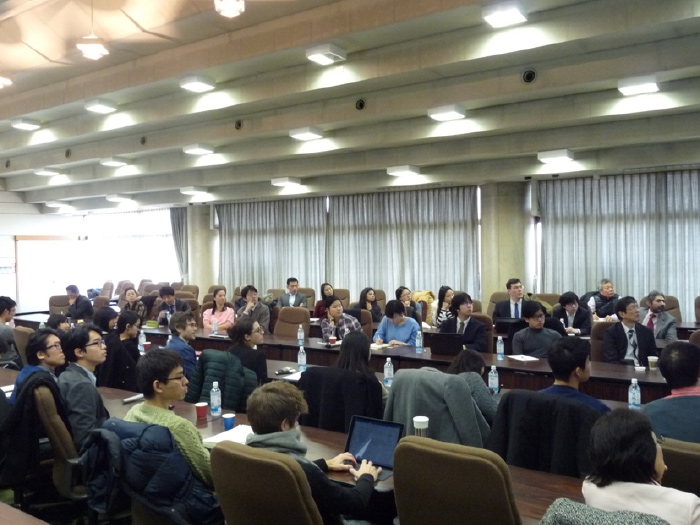
He made five points about democracy:
- The rise of democracies has been an uneven process, progress has not been gradual, but democratisation has come in several waves.
- Democracy as “the rule of the majority” is not sufficient, that system needs to be tempered by means of legal and institutional mechanisms, such as rights and freedoms, but also constitutional checks and balances (and therefore the division of powers), in order to avoid populism and demagoguery. Now we see the use of democracy to undermine such safeguards and in the end liberal democracy itself.
- We cannot, as political scientists, predict when a country will become democratic, but we know (or used to know) the chances of a country to remain a democracy, which was linked to a minimum per capita income. However, what is now happening in Turkey is challenging such findings.
- Democracies need a congenial international order to thrive. The great expansion of democracy in East Asia and Europe was supported by the US and the EU. In Asia, the alliance system centred on the US played a role in democratic transitions; EU and NATO provided frameworks for Eastern Europe after the collapse of the Soviet bloc.
- Liberal democracies have a unique capacity to build international order. There is a liberal accomplishment that needs to be remembered, there is long list of accomplishments in all fields, from disarmament to the environment, from international law to peacekeeping, which should never be forgot.
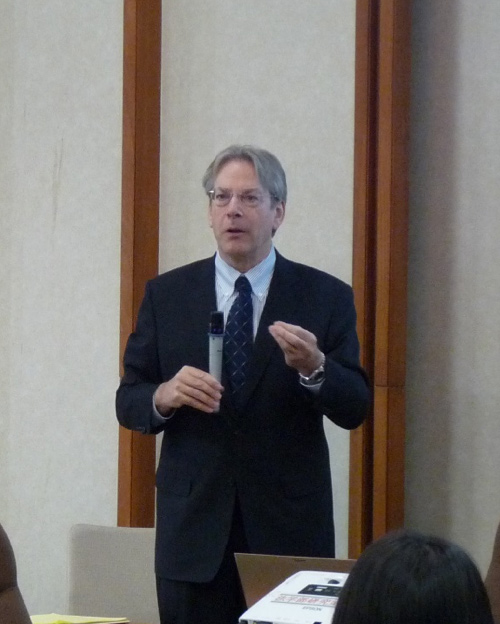
Why has all this come to a crisis? Professor Ikenberry offered a number of possible narratives or “stories”. First there is an economic story: within the Western world, there are numerous citizens who are not doing well. White males have been particularly penalised in the past few decades, inequality is growing, especially because of technological change. 100% of economic gains have gone to the top 20%. There is then the complex question of global equality, albeit studies show that globally inequality is going down. This background of even economic growth is the breeding ground of hostility towards immigrants and a general sense of suspicion against the elites, which allows phenomena like Trump. Secondly, there is a political story, namely the constant erosion of public confidence in the press, the experts, and the elites. This has been occurring for a number of decades, visibly in the decline of political parties, but had a great acceleration in recent years. There is also far less regard for the idea of democracy as a value, particularly in the younger population in the West. Narratives which try to sideline democracy have to be monitored, and they are a particular source of concern.
Thirdly, there is an international story, to be articulated in the following points a) we are in the presence of a power transition from the Western world to Asia. The old patrons of the liberal order are weakening relative to the non-Western states, and there is not much to do about that, but it entails numerous challenges: can an order designed by the West be maintained by non-Western countries? It is possible, but historically this has never occurred before. b) There are new issues and instances of interdependence: environment, health, finance. Some of these problems are incredibly difficult to solve. c) We have to deal with an unprecedented diversity of states, democracies now come from very different cultural and historical backgrounds. Cooperation is difficult, and forums like the G20 (where some states are not democracies though) struggle to become truly productive with a view to a liberal order. d) The geostrategic rivalry between the US and China can pose serious threats to peace in the long run. e) The liberal internationalist project has weakened, and the path forward is much less clear today than it was in the past, which is also reflected in the fact that the US and other democracies are less and less attractive models for others to follow. Even across the liberal democratic world something has been lost, namely the sense that the future will be better than the present and the past, a very common feeling in the last few generations, which seems it will not extend to the next one.
In conclusions, Professor Ikenberry stated that the convergence of all these factors has led to a situation where nationalism is returning, while paradoxically internationalism is now defended mostly by elites (for instance at Davos) who are losing political ground. Over the last 200 year liberal internationalism was tied to a progressive movement within liberal democracies, what happens when the connection is broken, or when progress in the old sense of each generation doing better than the last, ends? These are disturbing questions. Liberals have the duty to remain relatively optimistic, and work towards a renewed liberal international project, more inclusive and social, both at home and abroad.
